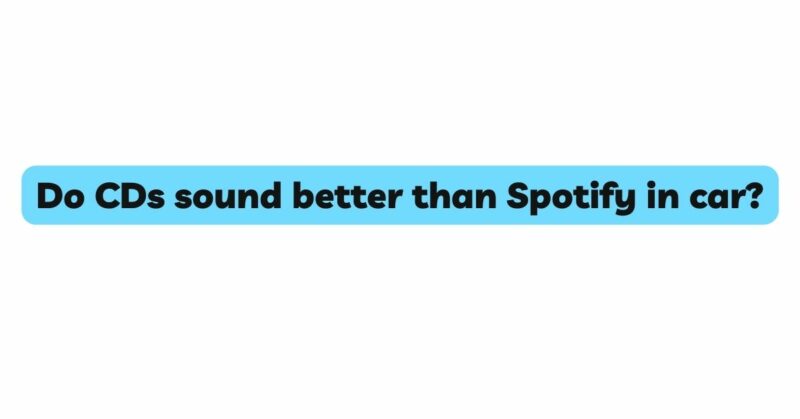In today’s digital age, music consumption has undergone a significant transformation. With the rise of streaming platforms like Spotify, listeners have unprecedented access to vast music libraries, enabling them to enjoy their favorite tunes on the go. However, the question of audio quality remains a pertinent topic of discussion. Do the convenience and accessibility of streaming services compromise the sound quality, especially when compared to the traditional Compact Disc (CD) format? In this article, we delve into the nuances of sound quality, exploring whether CDs indeed offer a superior auditory experience to Spotify when played in car audio systems.
The Evolution of Music Consumption
The inception of the Compact Disc in the 1980s revolutionized the way people listened to music. With its promise of pristine sound quality, the CD rapidly replaced vinyl records and cassette tapes as the preferred medium for music enthusiasts. The emergence of digital music marked yet another shift in the music industry. MP3s and digital downloads gained traction, offering a compromise between portability and audio quality. However, the real game-changer arrived with the advent of music streaming services like Spotify, which granted subscribers access to an enormous catalog of songs, anytime and anywhere.
Understanding Audio Compression
One of the central factors influencing the quality of music playback is audio compression. Streaming services employ various compression algorithms to reduce the size of audio files, ensuring efficient transmission over the internet and conserving device storage space. While compression is essential for seamless streaming, it can have an impact on sound quality. Spotify, like many streaming platforms, uses lossy compression techniques that discard certain audio data deemed less essential for human perception. This process, while imperceptible to many listeners, can lead to a reduction in the overall fidelity of the music.
CDs, on the other hand, utilize a different approach. Compact Discs store audio in a format known as Pulse Code Modulation (PCM), which represents the original analog audio waveform as a series of numerical samples. These samples are subsequently converted back into analog signals for playback, resulting in sound quality that is remarkably faithful to the original recording. Unlike lossy compression, which sacrifices audio data, CDs preserve the complete range of frequencies and subtleties that artists and producers intend for listeners to experience.
The Role of Bitrate
Bitrate is another critical factor that impacts audio quality. It refers to the number of bits (data) processed per unit of time. In the context of digital audio, higher bitrates generally translate to better sound quality. Spotify offers a range of bitrates, with the free tier using a lower bitrate to conserve bandwidth and storage. The premium tier provides higher quality audio, with bitrates of up to 320 kbps for the Ogg Vorbis format.
Comparatively, CDs possess a fixed bitrate of 1,411 kbps. This significant disparity in bitrates suggests that, theoretically, CDs should deliver superior audio quality due to their ability to retain more audio data. However, the impact of bitrate on perceived sound quality is not always straightforward, as other factors such as encoding methods and audio mastering play crucial roles.
The Car Audio Environment
Listening to music in a car introduces a unique set of variables that can influence the listening experience. Factors like road noise, cabin acoustics, and the quality of the car’s audio system all contribute to how music is perceived. These variables interact differently with the audio produced by streaming services and CDs, potentially altering any differences in sound quality.
Car audio systems are designed to reproduce audio across a range of frequencies and dynamics, but they vary widely in terms of quality. Premium car audio setups might offer exceptional sound quality, while standard factory-installed systems could limit the potential for discerning differences in sound source quality. Therefore, while CDs might have an inherent advantage in terms of audio fidelity, this advantage may be diminished in cars with less sophisticated audio systems.
Subjective Listening Tests
The question of whether CDs sound better than Spotify in cars often comes down to individual preference. The human auditory system is remarkable but also subject to various biases and limitations. Blind listening tests have been conducted to ascertain whether people can reliably differentiate between CD-quality audio and high-quality streaming audio in a car environment. Results have been mixed, with some studies indicating that a majority of participants struggle to consistently discern the differences.
Conclusion
In the ongoing debate about sound quality, the comparison between CDs and Spotify in car audio systems is complex and multifaceted. While CDs theoretically offer higher bitrates and less audio compression, the impact of these factors can be influenced by the car’s audio setup, individual listening preferences, and the challenges of the mobile listening environment. Advances in audio compression and streaming technology have narrowed the gap between the two formats, making it increasingly difficult for the average listener to distinguish between them.
Ultimately, the decision between CDs and Spotify depends on personal priorities. If audio quality is paramount and the car audio system is of high quality, CDs might offer a more satisfying experience. On the other hand, for those who prioritize convenience, access to a vast music library, and are content with very good audio quality, streaming services like Spotify present an attractive option. In the end, the evolution of music consumption has given rise to diverse choices, catering to a wide spectrum of preferences and priorities.


